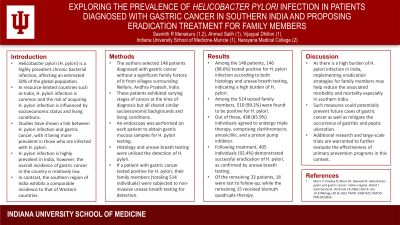Monday Poster Session
Category: Stomach
P2762 - Exploring the Prevalence of Helicobacter pylori Infection in Patients Diagnosed with Gastric Cancer in Southern India and Proposing Eradication Treatment for Family Members
Monday, October 23, 2023
10:30 AM - 4:15 PM PT
Location: Exhibit Hall

Has Audio
- SM
Sasmith Menakuru, MD
Indiana University School of Medicine
Muncie, Indiana
Presenting Author(s)
Sasmith Menakuru, MD, Ahmed Salih, MD, Vijaypal Dhillon, MD
Indiana University School of Medicine, Muncie, IN
Introduction: Helicobacter pylori (H. pylori) is a highly prevalent chronic bacterial infection, affecting an estimated 50% of the global population. In resource-limited countries such as India, H. pylori infection is common and the risk of acquiring H. pylori infection is influenced by socioeconomic status and living conditions. Studies have shown a link between H. pylori infection and gastric cancer, with it being more prevalent in those who are infected with H. pylori. Although H. pylori infection is highly prevalent in India, the overall incidence of gastric cancer in the country is relatively low. However, the southern region of India exhibits a comparable incidence to that of Western countries.
Methods: The authors selected 148 patients diagnosed with gastric cancer without a significant family history of the disease from villages surrounding Andhra Pradesh, India. These patients exhibited varying stages of cancer at the time of diagnosis but shared similar socioeconomic backgrounds. An endoscopy was performed on each patient to obtain gastric mucosa samples for H. pylori testing. Histology and urease breath testing were utilized for H. pylori detection. If a patient with gastric cancer tested positive for H. pylori, their family members (totaling 514 individuals) were subjected to non-invasive urease breath testing for detection.
Results: Among the 148 patients, 146 (98.6%) tested positive for H. pylori infection according to both histology and urease breath testing, indicating a high burden of H. pylori. Among the 514 tested family members, 510 (99.2%) were found to be positive for H. pylori. Out of these, 438 (85.9%) individuals agreed to undergo triple therapy, comprising clarithromycin, amoxicillin, and a proton pump inhibitor. Following treatment, 405 individuals (92.4%) demonstrated successful eradication of H. pylori, as confirmed by urease breath testing. Of the remaining 33 patients, 18 were lost to follow-up, while the remaining 15 received bismuth quadruple therapy, which eradicated H. pylori.
Discussion: Given the high burden of H. pylori infection in India, implementing eradication strategies for family members may help reduce the associated morbidity and mortality, particularly in southern India. Such measures could potentially prevent future cases of gastric cancer as well as mitigate the occurrence of gastritis and peptic ulceration. Additional research and large-scale trials are warranted to further evaluate the effectiveness of primary prevention programs in this context.
Disclosures:
Sasmith Menakuru, MD, Ahmed Salih, MD, Vijaypal Dhillon, MD. P2762 - Exploring the Prevalence of Helicobacter pylori Infection in Patients Diagnosed with Gastric Cancer in Southern India and Proposing Eradication Treatment for Family Members, ACG 2023 Annual Scientific Meeting Abstracts. Vancouver, BC, Canada: American College of Gastroenterology.
Indiana University School of Medicine, Muncie, IN
Introduction: Helicobacter pylori (H. pylori) is a highly prevalent chronic bacterial infection, affecting an estimated 50% of the global population. In resource-limited countries such as India, H. pylori infection is common and the risk of acquiring H. pylori infection is influenced by socioeconomic status and living conditions. Studies have shown a link between H. pylori infection and gastric cancer, with it being more prevalent in those who are infected with H. pylori. Although H. pylori infection is highly prevalent in India, the overall incidence of gastric cancer in the country is relatively low. However, the southern region of India exhibits a comparable incidence to that of Western countries.
Methods: The authors selected 148 patients diagnosed with gastric cancer without a significant family history of the disease from villages surrounding Andhra Pradesh, India. These patients exhibited varying stages of cancer at the time of diagnosis but shared similar socioeconomic backgrounds. An endoscopy was performed on each patient to obtain gastric mucosa samples for H. pylori testing. Histology and urease breath testing were utilized for H. pylori detection. If a patient with gastric cancer tested positive for H. pylori, their family members (totaling 514 individuals) were subjected to non-invasive urease breath testing for detection.
Results: Among the 148 patients, 146 (98.6%) tested positive for H. pylori infection according to both histology and urease breath testing, indicating a high burden of H. pylori. Among the 514 tested family members, 510 (99.2%) were found to be positive for H. pylori. Out of these, 438 (85.9%) individuals agreed to undergo triple therapy, comprising clarithromycin, amoxicillin, and a proton pump inhibitor. Following treatment, 405 individuals (92.4%) demonstrated successful eradication of H. pylori, as confirmed by urease breath testing. Of the remaining 33 patients, 18 were lost to follow-up, while the remaining 15 received bismuth quadruple therapy, which eradicated H. pylori.
Discussion: Given the high burden of H. pylori infection in India, implementing eradication strategies for family members may help reduce the associated morbidity and mortality, particularly in southern India. Such measures could potentially prevent future cases of gastric cancer as well as mitigate the occurrence of gastritis and peptic ulceration. Additional research and large-scale trials are warranted to further evaluate the effectiveness of primary prevention programs in this context.
Disclosures:
Sasmith Menakuru indicated no relevant financial relationships.
Ahmed Salih indicated no relevant financial relationships.
Vijaypal Dhillon indicated no relevant financial relationships.
Sasmith Menakuru, MD, Ahmed Salih, MD, Vijaypal Dhillon, MD. P2762 - Exploring the Prevalence of Helicobacter pylori Infection in Patients Diagnosed with Gastric Cancer in Southern India and Proposing Eradication Treatment for Family Members, ACG 2023 Annual Scientific Meeting Abstracts. Vancouver, BC, Canada: American College of Gastroenterology.
